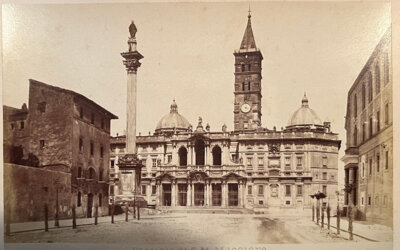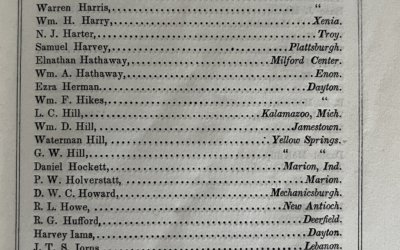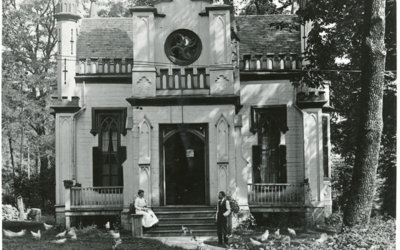After more than a month battling the New Orleans Yellow Fever Epidemic of 1837, the worst outbreak there in fifteen years, 20 year old medical student Wellington Peabody wrote to his mother. He relates grim details of the death toll on the city’s immigrant population, known commonly in New Orleans as “strangers”, assuring her of the measures he takes to see that he does not become infected himself, including doses of carbonate of ammonia, a forerunner of baking soda. Apart from caring for the patients in Dr. MacFarlane’s 100 bed hospital, he is also treating his brother George, who has come to town seeking work, for a discomfort in his spine he’d suffered from all summer. Wellington hopes the fall temperatures will stem the tide of the disease as had been the case in previous outbreaks.
In her tremendous triple biography “The Peabody Sisters: Three Women Who Ignited American Romanticism,” Pulitzer Prize winning author Megan Marshall explains that George Peabody is in the advanced stages of tuberculosis, another ailment completely baffling to physicians of the time. The spinal form of TB, one of oldest diseases known to humans (found in 5000 year old Egyptian mummies, for instance), outwardly manifests itself with painful abscesses on the spine that would account for the “issue” Welly has opened on his brother. George survived the epidemic swirling around him but not the tuberculosis, dying just two years later at age 26.
As with the letter to his sister, Wellington makes clear to his mother his goal to make a great reputation as an expert on Yellow Fever. Given his level of knowledge as well as the assumptions of the medical establishment in the 1830s, he can understand very little about it. His success rate at curing patients, impressive as it is, fails to consider the possibility that they may have recovered without his attention. As Megan Marshall wrote: “Yellow fever kills its victims quickly. Most patients well enough to reach the hospital would have survived anway, but Wellington didn’t know that.” Convinced of the transmission of sickness by miasmatic air, to avoid catching cold from the unpredictable weather he wears heavy clothes despite the late summer heat, not realizing that in doing so he also protects himself from mosquito bites he does not know to be infectious. Although Wellington knows that yellow fever historically abates in the fall and winter, the miasmatic theory cannot account for the contributing factor of a reduced insect population.
Without giving too much away, Wellington Peabody completed his letter home but someone else mailed it. The notations from its collector and transcriber, Robert L. Straker (class of 1925), indicate that someone, Straker doesn’t know who, has copied the original twice and added their own notations on one copy and some excerpts from George’s letters on the other. His employer Dr. MacFarlane, grateful for Wellington’s attentiveness to his patients and the long hours he worked, seems a likely candidate.
(RLS) Verso addressed: Mrs. Elizabeth Peabody, Care of Dr Nath’l Peabody, Salem, Massachusetts. Postmarked New Orleans, La., Oct. 6. 25
New Orleans, September 22, 1837
My dear mother,
I am sufficiently astonished at not hearing from you since the 15th of last month, especially when your maternal feelings must have been considerably excited, by the dismal accounts which must have reached you eer this, about the terrible epidemic, now visiting this city. Terrible indeed, where from perhaps there have a precious few strangers escaped – one hundred have been dying daily for these three weeks past and though there is some dimunition in the mortality of the disease at the present time, it is not so much from the purity of the air and the removal of the causes of disease, as from the want of subjects, for them to act upon. Amongst the great number of strangers residents of long standing, and even Creoles of the state, who have been attacked, and swept away – I have stood unscathed. And although the oppressive weather has oftentimes exhausted me and made me feel unwell, I have escaped sickness, by attending immediately to any little symptom, which might degenerate into fever. By the use of a little calomel, limewater, and carbonate of ammonia, and under God’s providence – I am now well and hearty. George is here now, and has got into Gamble’s for awhile – for these three or four days past he has had some little fever – but is pretty well again. I have opened an issue on his spine, and he has already felt some benefit from it – and I intend devoting much of my cogitations, to the peculiarities of his case – and hope in the course of five or six months to work a cure. This winter, as soon as the atmosphere contains any electricity, I intend giving him two or three electric shocks daily – which will I hope benefit him much. He lives very near me, and I see him two or three times daily. The weather for the past week has been quite cool – and there has been considerable rain, and if these continue long enough, it will have a favorable effect upon the epidemic. Indeed it has already done so. Yet the unfortunate immigrants, who come here, come to the grave or to its brink, so dire is the pestilence. The first frost will terminate it, which heaven send speedily.
My labors here have been tremendous. Our hospital, public & private case contain a hundred patients – and the private infirmary has been filled with yellow fever for this month past. Of course, my duties have been arduous and constant in the extreme. Too busy to be sick – I have also done a little something on my own account out of the house, and have had very good success in my practice. If I collect what is due me, I shall get upwards of $300 – one hundred of which I shall forward to father and the rest I shall put in the bank – hoping to add to it gradually and bring home a decent sum. I have made up my mind to construct a thesis, on Yellow Fever, for my graduating offering to the Massachusetts Medical Society – Its causes – its nature, its pathology, its treatment, in order, together with the topography of New Orleans – and its adaptation to miasmatic fever. If I can carry out my idea, it will not be unacceptable to the Medical Society – since I shall develop the most rational practice – as proved by twelve years trial. Out of upwards of 120 cases in Dr McFarlane’s practice, during the present season – only six have died -.and the result of cases in this hospital has been equally favorable. I myself have had a considerable number of patients say twenty and more and have lost but one, and this patient no one could have saved, for he had been long sick with intermittent fever, and could not bear up against the power of such a disease. I would not try another summer for a kingdom. It is a vile climate – no stability in it – Ever shifting – hot, dry, cold, moist, in rotation, & in one day. I wear thick winter clothes and flannels throughout – Having no notion of being imposed upon by such a humbug state of weather. If I roll down rivers of perspiration part of a day, I do not freeze the rest of it – and I therein am safe, and never caught unprepared.
No letter from Mary Bordman yet – but I do not despair and shall not, till the verdict comes from her own lips. I can enter into her case, and forgive every want of mental strength – and shall require little, till I come back next summer – which I shall do, the first of August next, if I live so long. I intend writing again to her in a day or two. I shall continue to do it, till I return. For I know that she will be glad to hear from me even if she has not courage to give me an answer.
After the month of October there will be little sickness except as much as is usual in all places. I shall have a little rest, for I have been working from daylight till eleven o’clock, during these five weeks past – and have had little time to refresh myself or read regularly, any medical book – and I must read much this winter and collect matter for my thesis for I must try to get some reputation – and if my production is what it should be, it will be printed in some of the journals. Give my love to all, and tell me how things prosper with you. I hope Sophia, poor thing, is doing well – and Nat – and all. My heart yearns for New England – its pure air, its glorious forests, & farms – its morals so pilgrim-like – who knows the value of home, but the poor fellow who dwells amid strangers – and sees no kindred spirit – enjoys no kindred associations! “There is no place like home.”
If George has any thing to say – I have left him little room.
Yrs affectionately
Wellington
Two copies, in an unknown hand, are with the original. One has this notation; “This was written 22 Sept. He was taken sick the 24 & died the 29 Sept 1837.” The other copy has these notations:
The above was written on the 22, probably on the evening of Friday – He was taken sick on the next Sunday morning & died on Friday morning 29, 2 oclock.
Extracts from George’s letters
Sept. 28. Wellington had some patients himself & did not practice the good advice he gave me, but exposed himself considerably…He is the greatest possible favorite with all the sick in the Hospital & appears to me to fill his place admirably.
Sept. 30. He died universally regretted by all the sick, to whom he had been remarkably attentive & kind. He is a loss that Dr McFarlane will find it difficult to supply.
Oct. 22. One of the physicians at the Hospital thinks the immediate cause of his taking the fever was at the postmortem examination of a subject which died of it, 15 or 20 hours after death. He handled it with great freedom & was finally dissuaded from pursuing the examination by the other physician who had had the fever & yet was taken sick, as was also a negro man who assisted. Wellington worked very hard in the Hospital. It is capable of containing 100 patients & he had to look after the comforts of all of them & give them their medicine & mix it besides. They were all much attached to him & he had gained the esteem & approbation of a number of other physicians who frequented the Hospital. I heard Dr McFarlane speaking of him in the highest terms to Parson Clap for his zeal in his profession & his devotion in coming out here in the midst of pestilence.
Image: “The New Orleans Charity Hospital” from Harper’s Weekly, September 3, 1859, via archive.org
“Songs From the Stacks” is a regular selection from Antiochiana: the Antioch College archives by College Archivist Scott Sanders.



